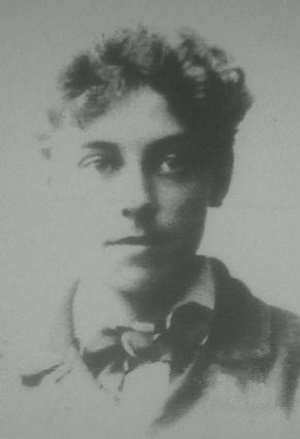Charlotte Mew
On the Road to the Sea
We passed each other, turned and stopped for half an hour, then went our way,
I who make other women smile did not make you—
But no man can move mountains in a day.
So this hard thing is yet to do.
But first I want your life:—before I die I want to see
The world that lies behind the strangeness of your eyes,
There is nothing gay or green there for my gathering, it may be,
Yet on brown fields there lies
A haunting purple bloom: is there not something in grey skies
And in grey sea?
I want what world there is behind your eyes,
I want your life and you will not give it me.
Now, if I look, I see you walking down the years,
Young, and through August fields—a face, a thought, a swinging dream
perched on a stile—;
I would have liked (so vile we are!) to have taught you tears
But most to have made you smile.
To-day is not enough or yesterday: God sees it all—
Your length on sunny lawns, the wakeful rainy nights—; tell me—;
(how vain to ask), but it is not a question—just a call—;
Show me then, only your notched inches climbing up the garden wall,
I like you best when you are small.
Is this a stupid thing to say
Not having spent with you one day?
No matter; I shall never touch your hair
Or hear the little tick behind your breast,
And as a flying bird
Brushes the branches where it may not rest
I have brushed your hand and heard
The child in you: I like that best
So small, so dark, so sweet; and were you also then too grave and wise?
Always I think. Then put your far off little hand in mine;—
Oh! let it rest;
I will not stare into the early world beyond the opening eyes,
Or vex or scare what I love best.
But I want your life before mine bleeds away—
Here—not in heavenly hereafters—soon,—
I want your smile this very afternoon,
(The last of all my vices, pleasant people used to say,
I wanted and I sometimes got—the Moon!)
You know, at dusk, the last bird’s cry,
And round the house the flap of the bat’s low flight,
Trees that go black against the sky
And then—how soon the night!
No shadow of you on any bright road again,
And at the darkening end of this—what voice? whose kiss? As if you’d say!
It is not I who have walked with you, it will not be I who take away
Peace, peace, my little handful of the gleaner’s grain
From your reaped fields at the shut of day.
Peace! Would you not rather die
Reeling,—with all the cannons at your ear?
So, at least, would I,
And I may not be here
To-night, to-morrow morning or next year.
Still I will let you keep your life a little while,
See dear?
I have made you smile.
| About the poet |
|
| By the same poet |
| Sea Love |
| The Peddler |
| To a Child in Death |
| Madeleine in Church |
| The Farmer’s Bride |
| The Trees are Down |
| Ken |
| In Nunhead Cemetery |
| The Cenotaph |
| On the Asylum Road |
| June, 1915 |
| The Call |
| I Have Been Through the Gates |
| Beside the Bed |
| Related books |
| Charlotte Mew at amazon.co.uk |
Support this site
Please help us to improve this site by supporting the site on Patreon. As a supporter you will get access to the English Verse Discord server, where you can meet other poetry enthusiasts and help shape the development of the site.
 Charlotte Mew
Charlotte Mew